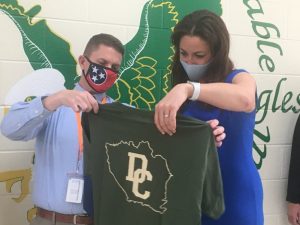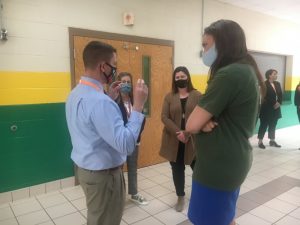News
Tennessee Commissioner of Education Visits Northside Elementary School
April 17, 2021
By: Dwayne Page
Penny Schwinn, the Tennessee Commissioner of Education, visited Northside Elementary School on Friday.
Schwinn walked the halls and observed first hand the learning environment of students here. She even joined in with students on bongos during a music class.
Commissioner Schwinn was welcomed by Director of Schools Patrick Cripps along with Northside Elementary School Principal Karen Knowles, Assistant NES Principal Beth Pafford, and members of the central office staff including Supervisors of Instruction Dr. Kathy Bryant and Michelle Burklow and Federal Programs Supervisor Dr. Danielle Collins.
“I am thrilled to be here. Its been a wonderful visit. I want to make sure I am able to see what is actually happening in schools and talk to principals, teachers, superintendents and students to learn how we can better serve them,” said Commissioner Schwinn.
Although COVID-19 has forced school systems to change their methods of teaching over the last couple of years, Commissioner Schwinn said she is proud of the way educators have adapted.
“There are a lot of folks doing really hard work this year overcoming challenge after challenge but keeping the focus on students and that is exactly what you want to see. Our focus has to be on kids. That’s what I have seen in every classroom in this building.”
Commissioner Schwinn said she is concerned about a learning loss among students across the state due to the pandemic
“You have students who have been in quarantine who maybe have not had internet access who have been in and out of school buildings and all of them are progressing differently. We want to make sure we are providing them with what they need to be able to not just get to where we would always want them to be but to accelerate for next year,” she said.
Virtual learning has not been as effective as hoped in many cases.
“At the elementary level its really though. We’ve seen that its been a little more successful on the high school level statewide buts its really hard for little kids to learn on a computer and not have that adult support right there. That’s why we are really focusing on making sure that families and students feel comfortable being in school buildings so that when we are in person fully next year folks are able to really dive in,” said Commissioner Schwinn.
Still at the high school level, graduation rates are expected to be down statewide because of the pandemic.
“We are expecting some challenges with graduation rates especially for those students who are virtual. A lot of them have looked for jobs or become engaged in other things and its been hard to bring them back so we’re seeing a lot of investment coming into alternative programs. Can we offer more courses at night? Can we do more online courses for catch up? Remediation and support will be in place. It won’t impact the school district’s funding. We will still fund regardless of what their performance is but we really want to make sure that for those students who are not as engaged especially in the high school space there are a lot of options for them to get back on track,” said Commissioner Schwinn.
“I am seeing the light at the end of the tunnel. Its going to be a hard push to the end of the year. We are focusing on summer programs but next year we are working toward getting back to normal. That is where we need to be. That’s where our students and families want to be. Its all the hard work that goes into being able to open up next school year and be ready to go and hit the ground running,” she said.
Although it was largely a social visit, Director of Schools Patrick Cripps made Commissioner Schwinn aware of the concerns and needs of DeKalb County Schools and he was glad that she came here and took the time to listen.
“The Commissioner is always willing to listen so we told her what some of our concerns are with what is going on with education and where it is headed. We explained to her that we are facing a teacher and bus driver shortage. We also talked about the amount of testing we have to do and how it is compressed at the end of the year as well as the plans we have to write each year and how much time it takes to write those plans which keeps supervisors from being able to get out into the buildings to see more of what is going on with the kids. We also discussed with the Commissioner the virtual learning challenges we have had to face as far as the number of students not completing work or failing classes and the graduation rate where we have high school students not getting credit. I appreciate the fact that she was willing to listen to our concerns,” said Director Cripps.
“Doug” is the WJLE/DeKalb Animal Shelter featured “Pet of the Week” (View video here)
April 16, 2021
By: Dwayne Page
Looking for a fun dog with lots of energy? Then “Doug” is your guy!
“Doug”, a five year old yellow lab mix is the WJLE/DeKalb Animal Shelter featured “Pet of the Week”
“Doug is super fun, happy, and he loves everybody. Doug has already been neutered and is up to date on his vaccinations. We will microchip and heartworm screen him before he goes to his home. If you have another dog we would like to set up a meeting just to make sure he gets along with your pet but Doug is super happy so we don’t see it being a problem. Doug would be perfect for someone who is adventurous and likes to go running, hiking, swimming, etc. He is full of energy,” said Shelter employee Emmaly Bennett.
“If you would like to meet “Doug” go to our website under our adoptable animals tab at https://www.dekalbanimalshelter.com/ and you will be called to set up an appointment after you fill out an adoption application. For more information call 615-597-3647 or send a message on facebook or email,” said Bennett.
County Urged to Begin Planning for Redistricting
April 16, 2021
By: Dwayne Page
DeKalb County and all of Tennessee will have to undertake redistricting in 2021 once official 2020 US Census numbers are known this fall. What that means is boundary lines for state house, state senate, and congressional districts will have to be redrawn as well as districts and voting precincts within the county.
District lines are redrawn every 10 years following completion of the United States census. The federal government stipulates that districts must have nearly equal populations and must not discriminate on the basis of race or ethnicity.
The U.S. Census Bureau announced in February that it would deliver the detailed datasets needed for redistricting to the states by September 30, 2021, after the original April 1, 2021, deadline.
Redistricting has to be completed before the 2022 election cycle so that candidates and voters will know in which districts they reside.
On the local level, the County Commission will select a redistricting committee to recommend a plan to be adopted by the commission. Ten years ago the County Commission appointed itself as the redistricting committee but leaned on the Office of Local Government, a division of the State Comptroller’s Office, which had all the data and mapping systems to make the process more efficient. As for voting precincts, those district lines are drawn by the county election commission.
With census numbers unavailable until fall and a local primary expected in May, 2022, the election commission will be under pressure to make changes as quickly as possible once district lines are redrawn.
“Due to the late arrival of the official numbers, election offices all across the state will be under a great deal of pressure to complete necessary changes to district and precinct boundaries, “said DeKalb Administrator of Elections Dennis Stanley.
“Historically, the Democratic Party in DeKalb County holds a local primary which next year will be held May 3, 2022. If so again, and possibly Republicans as well, election law dictates that petitions can be issued beginning December 20, 2021”.
“If the county has a May primary, as it traditionally does, our office could give petitions to candidates beginning December 20, 2021 and that does not give us much time to change the voters and potential candidates who are impacted by redistricting. Candidates for County Commission obviously need to be in the correct district and to know which voters live in their district,” said Stanley
“While the official numbers will not be out until late September, it is my hope the county commission will go ahead and name a redistricting committee, make contact with the State Office of Local Government, a Division of the State Comptroller’s Office, and start setting up preliminary dates for meetings so once the numbers are here, the process of redistricting can begin without delay,” Stanley said.
On the state level redistricting is the process by which new congressional and state legislative district boundaries are drawn. Each of Tennessee’s nine United States Representatives and 132 state legislators are elected from political divisions called districts. United States Senators are not elected by districts, but by the states at large.
State Senator Mark Pody told WJLE Thursday that while the final census numbers are not yet known, preliminary results show growth in Tennessee and a dramatic shift in population from west and east Tennessee to middle Tennessee.
“The numbers are not all final yet and we probably won’t get those until fall possibly September but we know that all the districts in middle Tennessee on the congressional, state, and local levels will have to be reapportioned so each district has about the same number of people represented. Just on the preliminary numbers from our internal counts we know that there are now roughly 6,969,000 people in Tennessee. If you divide that up among the state’s 33 senators we can get an idea of how many people should be in each district. Middle Tennessee has grown with almost 200,000 more people than other parts of the state so that means that the Memphis and Knoxville areas will each be short about 100,000 people so that will have an impact on redistricting throughout the state,” said Senator Pody.
According to Senator Pody, it appears that he and State Representatives Terri Lynn Weaver and Clark Boyd as well as Congressman John Rose, who all represent DeKalb County, now have too many people in their districts.
“In my district, the 17th Senate District I am actually carrying (representing) about 30,000 more people than are supposed to be in this district so some of that population will be taken away from me by redrawing district lines,” said Pody. “ They will be redrawing John Rose’s congressional district lines as well because he has too many people in his district. All the state house districts will be changing as well. Representative Weaver as too many people in her district so those lines will be redrawn. Representative Boyd’s district will also change. Boyd currently represents Wilson, Cannon, and a portion of DeKalb County but Wilson County has changed so much that he will probably just be representing Wilson County alone. All the maps will be redrawn by the end of this year or early next year,” said Pody.
Following the 2010 United States Census, Tennessee was apportioned nine congressional seats.
Tennessee’s House of Representatives is made up of 99 districts; Tennessee’s State Senate is made up of 33 districts.
In Tennessee, congressional and state legislative district boundaries are drawn by the state legislature.
« First ‹ Previous 1 1066 1156 1164 1165 11661167 1168 1176 1266 2503 Next › Last »















